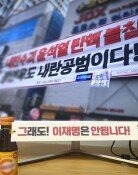More regulation to batter Korean economy, people
More regulation to batter Korean economy, people
Posted September. 15, 2012 08:29,
About 80 percent of business-related bills proposed since the opening of the 19th National Assembly seek to toughen regulations on corporate activities. A significant number of them were previously discarded legislation or copycat bills based on other parties proposals, such as those that would restrict cross-share holdings among affiliates or those limiting conglomerates from holding shares in other companies. Such an imbalance was created because many politicians are focusing on bashing big business amid growing clamors for economic democratization.
Entrepreneurs say what ruins the economy is leaning toward an extreme. Economic regulation means intervention aimed at establishing a fair order for competition and minimizing the side effects of the market. What it is not about is venting anti-corporate sentiment. Reckless corporate bashing aimed at winning an election will discourage the market at the expense of low-income people. Despite opinion polls finding that regulating large discount stores does not improve things for traditional markets, 14 bills on regulating large retail outlets have been introduced to the National Assembly since its opening earlier this year.
Economy-related regulations were newly adopted over the first six months of this year, including those on putting up entry barriers in the market, regulating sales activities, and controlling prices. The proposed plan to allow the medical market to be opened up to private investors has been put to the back burner due to occupational interests. Free economic zones, the outpost for attracting foreign investment, have failed to attract a hospital for foreigners. The proposed revision of a law on the capital market had been expected to create 18,000 jobs and 12 trillion won (1.08 billion U.S. dollars) in production, but has gone nowhere since the previous National Assembly discarded it. Regulatory reform that was supposed to reinvigorate the economy has gone adrift.
Korea should carefully consider that economic crises are forcing young people in Southern European countries, including Greece and Spain, to go overseas for jobs. French automaker Peugeot Citroën plans to cut 8,000 jobs and shut down plants in France. Depressed corporate activities and money outflows to other countries will make the Korean peoples livelihood even more difficult. Construction workers out of work are forced to live on high interest loans. What will revive the economy is not a skewed sense of equality that make people jealous about companies making money, but a positive social perception of businesses as creating revenue and jobs.
Headline News
- Pres. Yoon refuses impeachment documents for a week
- Debate over Lee’s participation causes friction in government consultative body
- Food and dining prices could increase en masse next year
- Foreign couple borrowed over $2 million to buy a Seoul house
- One-third of Japanese companies keep workers employed until 70







